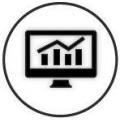Pandas is a Python package providing fast, flexible, and expressive data structures designed to make working with 'relational' or 'labeled' data both easy and intuitive. It enables doing practical, real world data analysis in Python.
In this workshop, we'll work with example data and go through the various steps you might need to prepare data for analysis.
We plan to cover:





